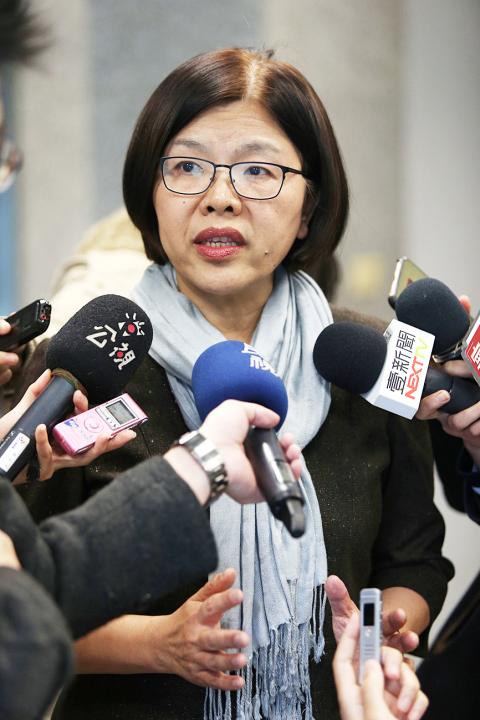The Chinese Nationalist Party (KMT) has refused to pay Cabinet-ordered compensation of NT$864.88 million (US$28.43 million) for selling properties appropriated from the Japanese colonial government, with the party saying that the properties were legally acquired and that it would appeal the order.
The Ill-gotten Party Assets Settlement Committee on June 15 ordered the KMT to pay for 458 properties appropriated from the former Japanese government, which were later sold or expropriated.
The payment was due yesterday and failure to meet the deadline could result in the freezing of assets and detention of the KMT chairperson, who acts as the party’s legal representative.

Photo: CNA
The KMT yesterday said it would launch an administrative suit against the committee’s “illegal order.”
The former Japanese properties were transferred to the KMT to compensate the party for its wartime expenses during the Second Sino-Japanese War, the party said.
The transfer was approved by a high-level decisionmaking body joined by top government and military officials and KMT dignitaries during the post-war period, and therefore the transferred properties were not ill-gotten, it said.
The KMT rejected the committee’s claim that the property transfer was made in violation of the principles of democracy and rule of law and beyond the authority of a political party, saying the transfer was completely legal.
The Act Governing the Handling of Ill-gotten Properties by Political Parties and Their Affiliate Organizations (政黨及其附隨組織不當取得財產處理條例) stipulates that a compensation order can only be given in cases where an ill-gotten property has been transferred to a third party and cannot be recovered.
The committee gave the order without first investigating the status of the properties in question, the KMT said.
Meanwhile, the committee said it would ask the Administrative Enforcement Agency to enforce the payment.
“The KMT has little cash at hand and its legal income cannot be the target of enforcement actions, so it should be the party’s real estate that is subjected to enforcement,” committee spokeswoman Shih Chin-fang (施錦芳) said.
The agency would follow due process and enforcement would not be affected unless the KMT requests a stay of execution to halt the committee’s order, but the party did not take any such action, Shih said.
Former Japanese properties should be national properties and historical data have shown how the KMT appropriated such properties, she added.

Taiwan is projected to lose a working-age population of about 6.67 million people in two waves of retirement in the coming years, as the nation confronts accelerating demographic decline and a shortage of younger workers to take their place, the Ministry of the Interior said. Taiwan experienced its largest baby boom between 1958 and 1966, when the population grew by 3.78 million, followed by a second surge of 2.89 million between 1976 and 1982, ministry data showed. In 2023, the first of those baby boom generations — those born in the late 1950s and early 1960s — began to enter retirement, triggering

ECONOMIC BOOST: Should the more than 23 million people eligible for the NT$10,000 handouts spend them the same way as in 2023, GDP could rise 0.5 percent, an official said Universal cash handouts of NT$10,000 (US$330) are to be disbursed late next month at the earliest — including to permanent residents and foreign residents married to Taiwanese — pending legislative approval, the Ministry of Finance said yesterday. The Executive Yuan yesterday approved the Special Act for Strengthening Economic, Social and National Security Resilience in Response to International Circumstances (因應國際情勢強化經濟社會及民生國安韌性特別條例). The NT$550 billion special budget includes NT$236 billion for the cash handouts, plus an additional NT$20 billion set aside as reserve funds, expected to be used to support industries. Handouts might begin one month after the bill is promulgated and would be completed within

NO CHANGE: The TRA makes clear that the US does not consider the status of Taiwan to have been determined by WWII-era documents, a former AIT deputy director said The American Institute in Taiwan’s (AIT) comments that World War-II era documents do not determine Taiwan’s political status accurately conveyed the US’ stance, the US Department of State said. An AIT spokesperson on Saturday said that a Chinese official mischaracterized World War II-era documents as stating that Taiwan was ceded to the China. The remarks from the US’ de facto embassy in Taiwan drew criticism from the Ma Ying-jeou Foundation, whose director said the comments put Taiwan in danger. The Chinese-language United Daily News yesterday reported that a US State Department spokesperson confirmed the AIT’s position. They added that the US would continue to

IMPORTANT BACKER: China seeks to expel US influence from the Indo-Pacific region and supplant Washington as the global leader, MAC Minister Chiu Chui-cheng said China is preparing for war to seize Taiwan, Mainland Affairs Council (MAC) Minister Chiu Chui-cheng (邱垂正) said in Washington on Friday, warning that Taiwan’s fall would trigger a regional “domino effect” endangering US security. In a speech titled “Maintaining the Peaceful and Stable Status Quo Across the Taiwan Strait is in Line with the Shared Interests of Taiwan and the United States,” Chiu said Taiwan’s strategic importance is “closely tied” to US interests. Geopolitically, Taiwan sits in a “core position” in the first island chain — an arc stretching from Japan, through Taiwan and the Philippines, to Borneo, which is shared by